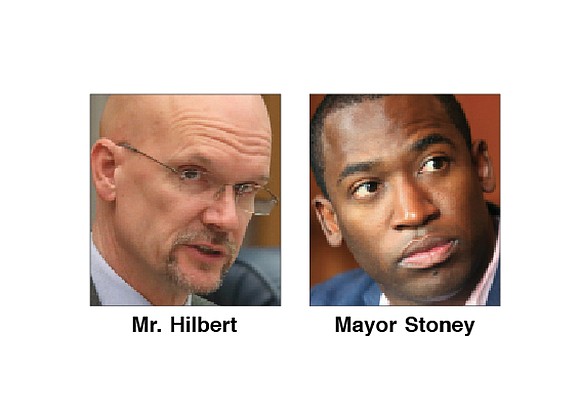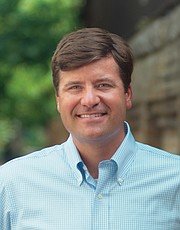Hilbert to mayor: Don’t veto City Council budget
Jeremy M. Lazarus | 5/19/2017, 8:04 p.m.
Money allocated to fix potholes or plow streets cannot be used for picking up trash unless Richmond Mayor Levar M. Stoney secures approval to shift the funds from Richmond City Council.
And dollars allocated to improve pay for police and firefighters cannot be shifted to buy needed equipment unless the mayor receives the council’s permission.
By a vote of 6-3 Monday night, City Council ushered in a new era of increased oversight over the way tax dollars are spent.
The vote came as the council approved a series of ordinances laying out spending plans for the 2017-18 fiscal year that will begin July 1.
The decision strips Mayor Stoney and his administration of discretion to move money around within major departments like Public Works, although smaller units, including the Mayor’s Office and City Council appointees, will retain full control of their money.
Will it have any effect on city residents?
Yes, said Mayor Stoney, who was absent from the meeting.
In just his fifth month in office, the youthful mayor fumed in a statement after the vote that City Council is taking “micromanaging to a new level.” He also said the change will “make city government less efficient and make it harder to deliver the services our residents deserve.”
No, said Council President Chris A. Hilbert. “This is inside baseball,” he said. ‘I don’t think it will have a huge impact outside City Hall.”
Mr. Hilbert urged Mayor Stoney to accept the council’s action in the spirit of “cooperation and collaboration” he espoused when he took office in January.
Mr. Hilbert essentially warned the mayor that he would lose if he vetoes the council’s amendment to the budget that creates what is described as a “program budget.” That means money is appropriated by programs and service codes within departments rather than as a lump sum per department as was previously the case.
Mr. Hilbert provided the sixth vote to pass the budget and made it clear that he would vote to override the mayor if Mayor Stoney uses his veto power to try to kill the council’s amendment.
It take six votes to override a veto, and Mr. Hilbert’s vote would be key to maintaining the council’s action. While he did not support the shift to a program budget, Mr. Hilbert is determined to avoid upheaval over the change.
His decision is a boost for the five council members who firmly supported the change, including the two authors, Kim B. Gray, 2nd District, and Kristen N. Larson, 4th District. Others supporting the change were Parker C. Agelasto, 5th District; Reva M. Trammell, 8th District; and Michael J. Jones, 9th District.
The no votes came from council Vice President Cynthia I. Newbille, 7th District; Ellen F. Robertson, 6th District; and Andreas D. Addison, 1st District. All three argued that the council has not done enough study to ensure the new approach is sound and would not impede city operations.
While rare in Virginia cities with modern finance operations, governing boards in many counties in the state still approve all spending. Ms. Gray and Ms. Larson, who previously served on the Richmond School Board, noted that the School Board votes on all expenditures before money is spent and the approved items are listed on the school system’s website.
Previously, the city administration was required to seek council approval only to move money from one department to another, with the administration and department heads having free rein to move money within departments as long as they did not go over their budgets.
Mayor Stoney tried to ward off what he sees as a blow to his management of the city. Ahead of the vote, he introduced a budget transparency ordinance that would require his administration to disclose in monthly financial reports to the council any shifts of money that departments make from one line item to another line item.
The push for increased oversight results in part from the city administration’s decision in December to spend without the council’s approval $1.9 million on employee bonuses before the departure of former Mayor Dwight C. Jones.
Council members also are frustrated at the administration’s disclosure that fiscal year 2016 ended June 30, 2016, with a $13 million surplus despite repeated claims from Chief Administrative Officer Selena Cuffee-Glenn that Richmond did not have enough money to keep the grass in parks, schools and other public property mowed, fill all potholes or collect tree limbs, appliances and other bulk items.
Ms. Trammell remains particularly incensed that city residents pitched in to mow grass on public property when taxpayer money to get the job done was reported to be short.
After the vote, Mr. Agelasto explained the need for greater City Council oversight by pointing to an amendment the mayor introduced that would move money in the 2016-17 budget from one department to another.
The amendment, for example, calls for shifting $2.6 million to Fire and Emergency Services to cover the cost of new breathing apparatus.
The public request for bids went out in October, Mr. Agelasto said, even though the department did not have enough money in its budget to cover the cost. He said he wonders if the administration knew the funding would be available later in the year, without giving any heads up to the council.
He also noted that the amendment calls for taking $1.46 million in unspent personnel money from the Police Department, which has been advocating for months for additional dollars.
Police Chief Alfred Durham said the money represents funds that were earmarked to pay the salaries of 23 officers, but was not spent because those officers retired or took jobs elsewhere.
He said the administration’s plan to take the money would not affect operations. He said he has enough money on hand to start training a new recruit class of 23 officers in mid-June, a week after 18 current recruits graduate.
However, Mr. Agelasto and other members consider it ludicrous that an administration that pushed to get $1.6 million in additional funds for the Police Department in January to pay for a recruit class is now telling the council the department is expected to finish the fiscal year with more money than it actually needed.
“This is a trust issue,” he said.







